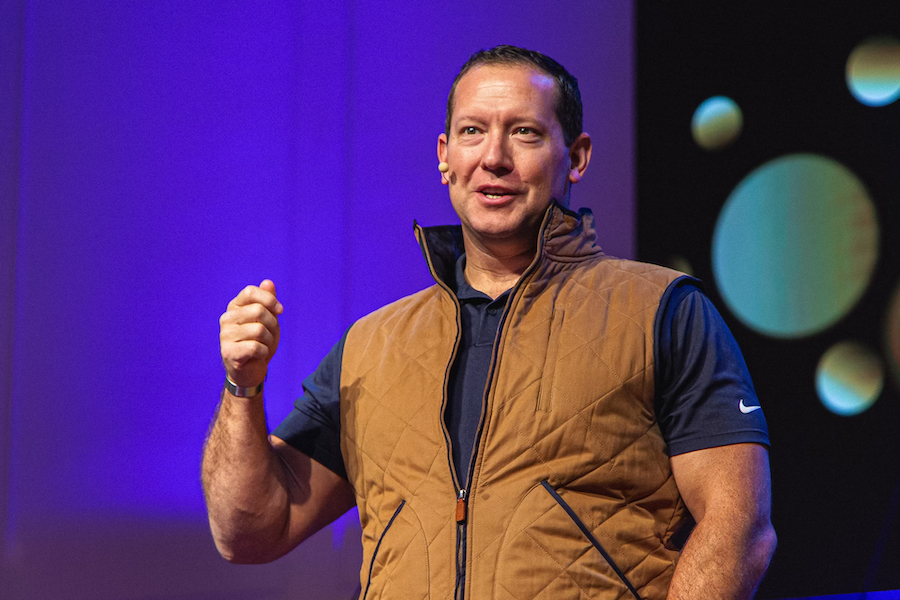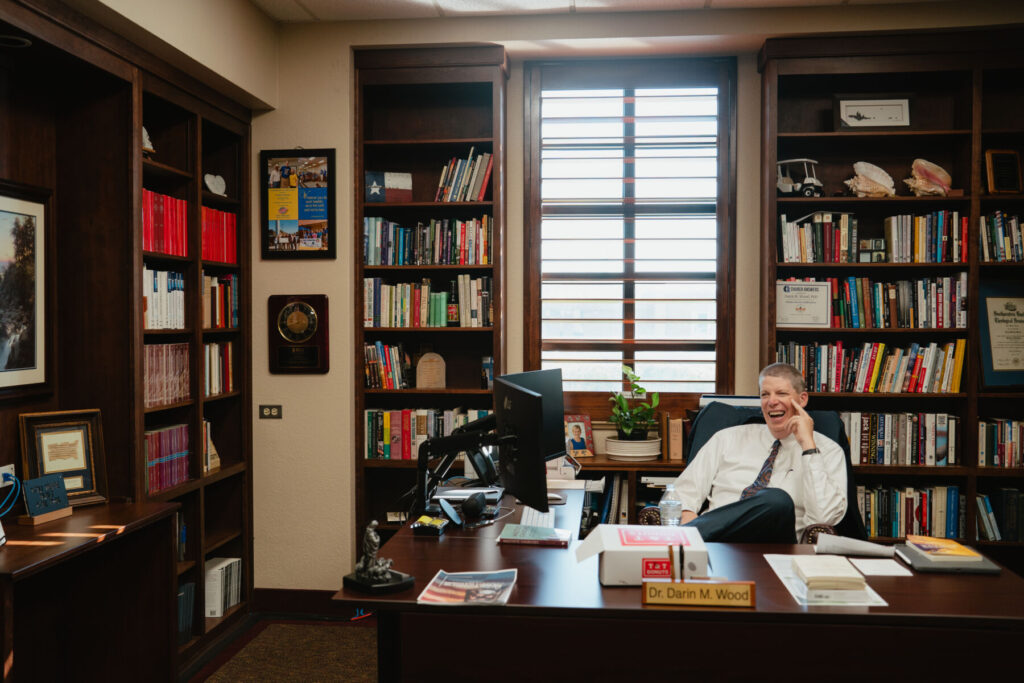Love God, Love the Word, Love People
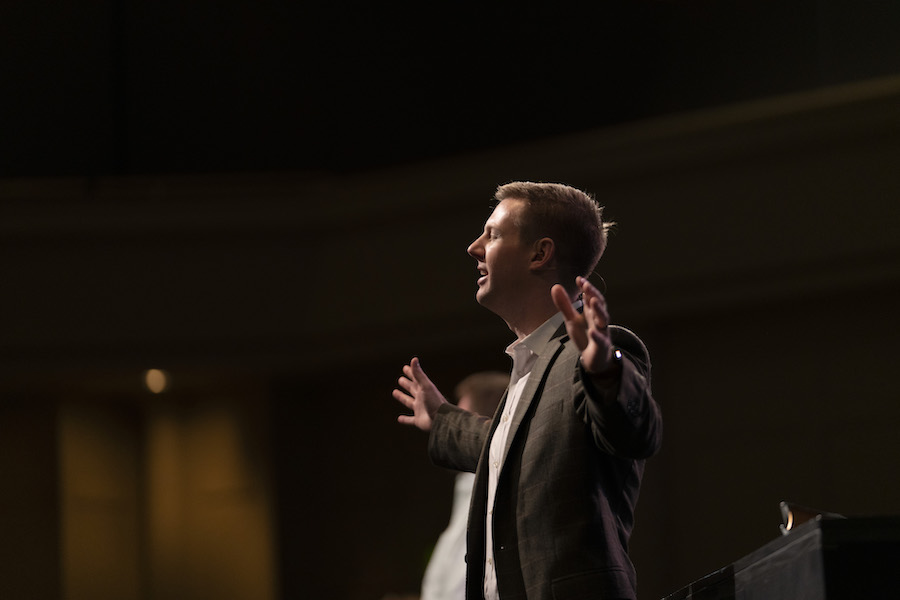
Editor’s note: This article originally appeared in the Spring 2023 issue of Southwestern News.
In the ninth chapter of the Gospel of Luke, verse 62, Jesus said, “No one who puts his hand to the plow and looks back is fit for the kingdom of God.” Many seminarians, pastors, and missionaries have studied this verse and embraced it as both a caution and an encouragement to steady their hearts and minds as they embark on the journey of obediently responding to God’s call on their lives.
When he left his home state of South Carolina in 2012 to pursue a Master of Divinity at Southwestern Seminary in Fort Worth, Texas, Daniel Dickard (‘14, ‘17) fixed his eyes ahead, ready to follow God’s calling – regardless of where it might take him.
“When God calls you into ministry, you go wherever He tells you to go,” Dickard says.
For a time, that meant Dickard would serve churches and students while he earned back-to-back degrees at Southwestern. In his role as director of student and church relations, Dickard functioned as a liaison between churches searching for qualified ministers of the Gospel, and students who were actively preparing to live their calling. He helped oversee aspects of the annual Spring Revival Practicum (now called “Revive the Nation”) – a program that began in the mid-20th century at Southwestern with the purpose of sending revival preachers out over spring break to preach in churches across the United States.
Appointed as dean of students in 2017, Dickard continued to invest in the spiritual formation and growth of students both in and out of the classroom. He taught preaching classes, in addition to his other roles, until God called him as senior pastor of Friendly Avenue Baptist Church in Greensboro, North Carolina, in the spring of 2018.
Dickard pastored Friendly Avenue through the COVID-19 pandemic and developed relationships with people at the church that will “last a lifetime.” Last year when he was approached by a mentor in ministry about submitting his resume for a denominational role, Dickard declined the offer, certain God had called him to be a pastor. The last thing he thought God would ask him to do is to leave the church he had pastored and loved for five years. But when God made it clear that he was amid a transition to another church, Daniel and his wife, Cassie, committed to pray and follow His leading.
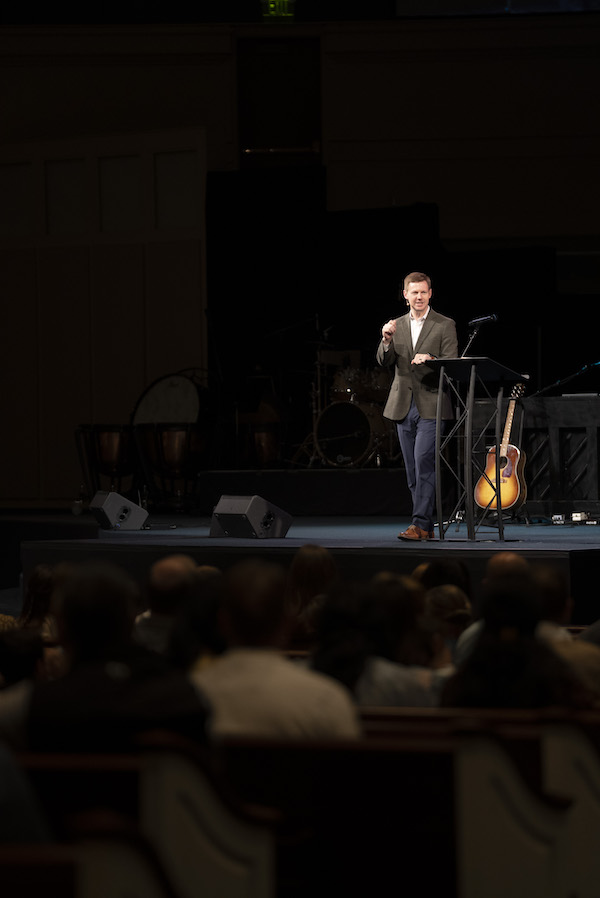
Daniel Dickard, a two-time Southwestern Seminary graduate, has pastored Shandon Baptist Church in Columbia, South Carolina, since February of this year.
A Ministry of Declaration
In one of the long, carpeted hallways along the outside of the worship center of Shandon Baptist Church in Columbia, South Carolina, Dickard stood with his family while they waited for an answer. Moments prior, in front of a packed worship center, he told those gathered what his ministry would focus on if they were to call him as their next pastor: the Word of God.
“My ministry is not a ministry of innovation or creation,” he told the congregation in his first sermon, preached in view of a call on January 22, 2023. “My ministry is a ministry of declaration – to declare to you what is in God’s Word.”
Ten minutes later, the chairman of the pastor search committee welcomed the Dickard family back into the auditorium to a room full of thunderous applause. The decision was unanimous to call him as the senior pastor of Shandon Baptist Church.
“To see how God and His sovereign and perfect plan saw fit, that I’d be able to come back to my home state, and to be able to lead a church that is making a difference among not only the next generation, but the current generation,” Dickard explains. “There’s something special about coming home and seeing God work in your state.”
Eleven years after he moved out of the state, Dickard returned to South Carolina to serve as lead pastor of Shandon but, in many ways, his time at Southwestern Seminary laid a foundation for the ministry to which God had called him.
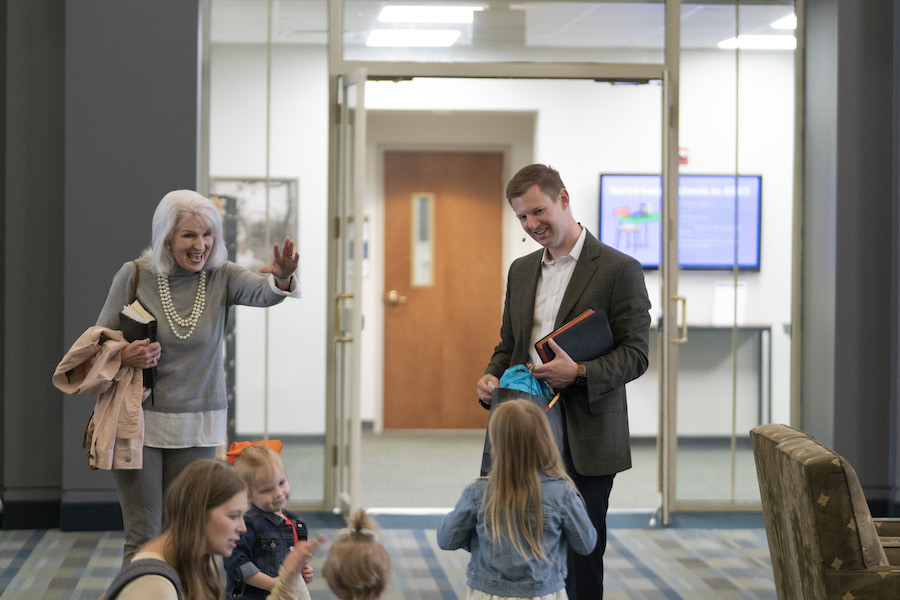
When the church voted to elect Dickard its next pastor, he told them his ministry would be to declare God’s Word to them.
‘Loving God and His Word’
“During my time at Southwestern not only did I gain a love for God, but I gained a love for God’s Word,” Dickard says. “The professors at Southwestern Seminary taught me that before I could be effective in pastoral ministry it begins with loving God and His Word.”
Dickard recalls that his professors taught him that God’s Word is the foundation for ministry. Lessons about ministry were not strictly taught in the classroom but were caught around plates of Mexican food and during discussions in the hallways with professors who weren’t just teachers but became “mentors and family.”
And those lessons have continued to yield fruit in how Dickard has approached his calling as a pastor.
“Southwestern Seminary taught me that it’s the height of arrogance for a pastor to think he has something more to say than what’s in God’s Word,” Dickard asserts. “Our job is to communicate God‘s Word … we are sharing the truth of God’s words.”
Matthew McKellar (‘85, ‘91), professor of preaching and occupant of the George W. Truett Chair of Ministry, is one of the many professors who had a significant impact on Dickard. McKellar, who served as a pastor for more than 28 years before coming to Southwestern as a professor, supervised Dickard’s doctoral work and taught many of the classes he took.
McKellar considers the fourteen years he has taught preaching at Southwestern Seminary to be one of the “greatest blessings in my life.” Meeting students in an introduction to preaching class and walking through advanced courses and doctoral supervision, much like he did with Dickard, he gets to see them progress, grow, and have a first-hand view of how “God just opens up their gift.”
“To be a part of that process,” McKellar says, “I don’t know that there’s anything sweeter than to have that opportunity.”
“He set an example of what it means not just to love preaching, but to love the people to whom you preach,” Dickard explains. Cultivating a love for the people to whom he will preach is a priority Dickard is focused on in his first few months at Shandon.
Love People
From the moment he arrived at Shandon, Dickard set aside time each week to get to know the members of his church and to hear from them. A conviction he brought with him to Shandon is that a shepherd should smell like the sheep, and he has eagerly sought ways to “be among the sheep.”
When his deacons asked to gather with him every Sunday morning to pray before the service, Dickard requested that they meet early in the morning so he could be out in the worship center among the congregation prior to the start of the service.
Joe Eudy, a 91-year-old deacon who has been a member at Shandon for 40 years, says this is one of the things he already loves about Dickard: “He’s out among our people before the service, talking to them, loving them, learning their names. He’s being a pastor before he’s a preacher.”
Dickard also implemented a weekly practice he has called, “Cottage Prayer and Listening Sessions.” Modeled after a practice of family ministry notable to the 17th century English theologian and pastor Richard Baxter, Dickard meets with various groups of people in the church once a week during the day and a second time during the week in the evenings to do two things: to listen and to pray together.
During these listening sessions and prayer times, Dickard wants to learn several things – what those in attendance love about Shandon, how they feel ministries of the church can be enhanced, and what they can do to collectively reach their city for Christ. These forums provide an additional way for the pastor to develop relationships in the body of Christ and include a time of prayer.
Dickard recognizes that the “public ministry” of preaching must be firmly undergirded by a strong pastoral ministry and truly getting to know the people. Through the cottage prayer initiatives, he recognizes “we’re seeing the fruits of the labor are getting to know the people that you preach to every week.”
“People are not just an aspect of our ministry; people are our ministry.”
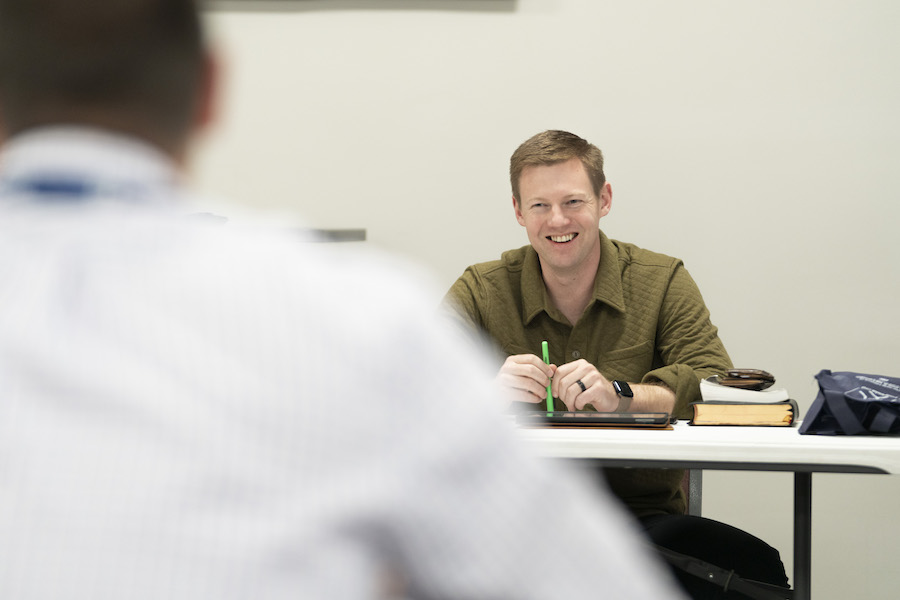
While shepherding the people at Shandon Baptist Church, Dickard has implemented Cottage Prayer and Listening Sessions to allow him to listen to and pray with the members of the church.
The Well-Being of the City
Situated at the near geographic center of South Carolina, the city of Columbia was approved as the state capital in 1786 and is home to the South Carolina State House, the University of South Carolina, and Fort Jackson, an army training center responsible for basic combat training for at least half of all soldiers who enter the United States Army. The second largest city in the state, Columbia was developed at the confluence of the Broad and Saluda rivers where they combine into the massive Congaree River.
Shandon Baptist Church has been rooted in the city of Columbia since it was founded in 1907. The first sanctuary the church met in was built on the corner of Woodrow and Preston streets in a neighborhood district referred to as “Old Shandon.” Originally less than two miles from the State House, Shandon Baptist Church is now located a few miles further east on Forest Drive, a stone’s throw from the front gate of Fort Jackson.
In the 116-year history of the church, Shandon has been an “evangelistic church that is biblically based with a heart for the city.” This heart for the city, and on-going fervor for evangelistic outreach in the community, is part of what God used to draw Dickard’s heart to this city and church.
“What excited me about Shandon was the Great Commission potential,” Dickard said. People come to Columbia for a variety of reasons – some to study at USC, some to be involved in government service in the state capital, and others who have made a commitment to defend their country. But ultimately, what Dickard sees that they all have in common is a need for the Lord.
“Columbia is certainly a place that needs the Gospel; [Columbia] needs the Lord. And I think that Colombia is stronger when Shandon is stronger. It’s our goal that through our ministry here that not just the church would benefit, but we would see the city become healthier and stronger in the Lord, because of what God is doing here,” he explains.
Character in Ministry Matters
In addition to the major transition from one church to another, and a move across the state line, Dickard has also been entrenched this year in the work of preparing for the 2023 SBC Pastors’ Conference in New Orleans. It’s a work into which he has thrown himself. In considering the nomination for the role of president of the Pastors’ Conference, to which he was elected at the 2022 SBC Annual Meeting in Anaheim, Dickard wanted the conference to reflect two things he has spent years of his ministry focused on: expository preaching and encouraging pastors.
“It seems like in so many pastors’ conferences today that there is a doom and gloom approach, that ministry is difficult,” Dickard noted. “But these are great days to be in pastoral ministry because we live in a culture where there are people who have much to live with, but not much to live for.”
The theme for the conference, “Character in Ministry Matters,” initially emerged while Dickard was preaching through a series in the Beatitudes at Friendly Avenue Baptist Church. He said God impressed on his heart that expositional sermons from Matthew 5 in tandem with sermons about the fruit of the Spirit from Galatians 5, would provide “two lanes” that comprise the program for this year’s Pastors’ Conference.
“And so, I hope that pastors at this year’s convention … will walk away encouraged, but also remembering that any ministry that’s eternal begins with Jesus’s life in and through us – that we are simply the conduit, allowing Jesus to use us to bless others.”
Dickard believes that his education at Southwestern Seminary prepared him to lead a church like Shandon because of the first-hand view he had of professors loving their students, loving the Lord, and focusing on the Word of God. His simple formula for every pastor to follow is encapsulated in three things:
“Love God, love people, preach the Word, and trust that the Spirit of God will use the preacher of God, as he’s preaching from the Word of God – in order to share the will of God – so people can know the mind of God.”
Adam Covington (’09) is senior editor of Southwestern News.
